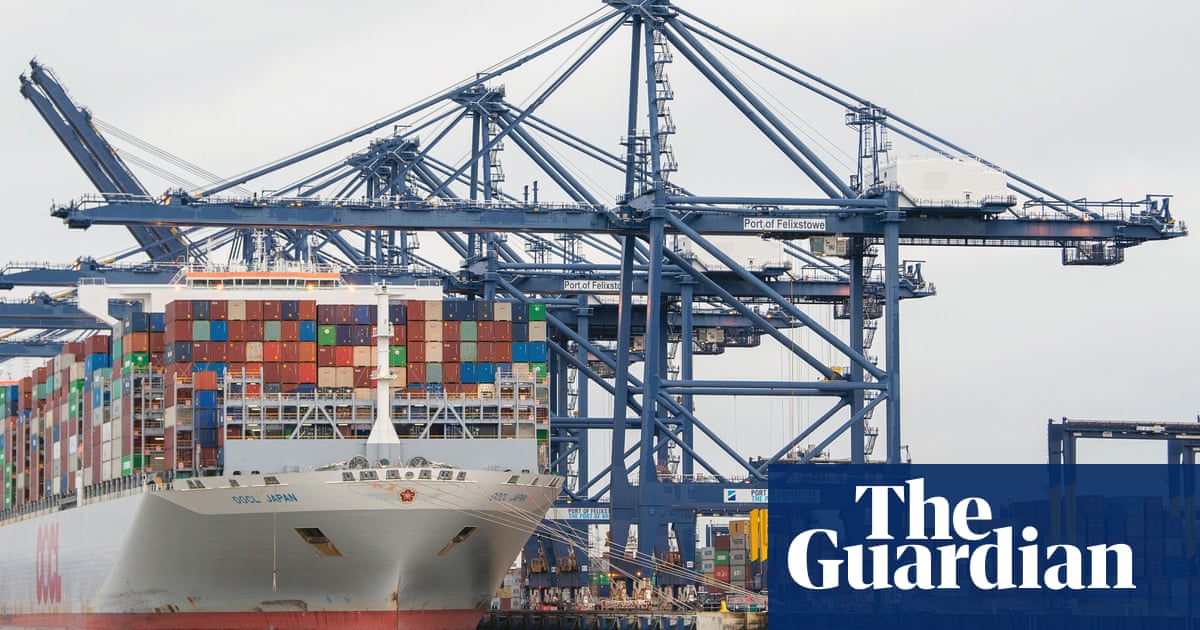Surprise Pikachu 😱😱😱
Pika pikaa??
It’s worth bearing in mind that some of this may also be down to the rules of origin of the UK EU TCA, not necessarily a reduction in actual trade. UK and EU branded clothing and footwear made outside Europe can no longer be counted as UK or EU exports. Instead they are now recorded as an export of the country where they were manufactured.
A lot of modern clothing is made in places like India or China and then branded in another. This would have then been classed as a UK export when sent to the EU, but this is no longer the case.
Not from the UK, I am wondering who benefitted from brexit?
Racists who are nourished by their fantasy that Brexit is hurting brown people.
Disaster capitalists.
William Rees-Mogg wrote 3 books in the 90s, I forget the 3rd one but the other two were called “(The Best Time To Buy Is When There Is) Blood In The Streets” and “The Sovereign Individual”. The latter describes a Sovereign as someone who earns more than $200k per year (90s money, so more like £500k today) and uses their wealth and influence to live above the laws of any nation. This is the kind of “sovereignty” his son Jacob Rees-Mogg campaigned for, he’s literally laughing at all his supporters while he’s doing it.
This is the kind of “sovereignty” his son Jacob Rees-Mogg campaigned for
No, it isn’t.
Edit: déjà vu
As was always the plan, the very rich and powerful are the only people who benefited from brexit.
It raised trade barriers, so potentially businesses that weren’t competitive with their counterpart businesses across the Channel.
If someone isn’t getting something from across the Channel, then they’re probably getting it domestically.
Everyone in the UK did.
Care to elaborate? How exactly did they benefit?
They’re no longer citizens of a nation state which is a member of the EU.
And that helps them how?
They really owned the libs there, didn’t they?
What are “the libs”?
Edit: mystified by the downvotes
Go away sealion
We’re free from stupid shit like mandatory free warranties on electronics, or chicken that doesn’t taste like the physical incarnation of sadness, or fresh vegetables where you don’t have to throw half away right after you buy it!
For a start it means that the structure of the government better reflects the concerns of the population. The EU never really made much of a dent in the consciousness of Britons. I expect the number of citizens who knew the name of their MEP off the top of their head would be dwarfed by the number of citizens who knew the name of their MP. This is in comparison to continental countries, particularly in my mind Germany, where the EU, EU political parties and MEPs are very much present in the minds of the electorate. At least, that was my experience.
Also, in my view the EU is quite undemocratic. The separate Council, Commission and Parliament are an affront. Especially the fact that the Parliament, which represents the electorate, does not have the power to introduce legislation. The people are an inconvenient afterthought in the EU power structure. I’m afraid I can’t find a link right this second but somewhere I have a copy of an interview with Yanis Varoufakis when he was finance minister for Greece back when they had their economic meltdown where he says that he was told by others around the halls of EU power that “the people” should not be given the power to decide economic policy. That, to me, is the EU. The British people are better off out of it.
EU Regional Development Funds are another horror. They’re run by unelected bureaucrats, stepping on the toes of existing, democratically elected regional institutions like… councils. Instead of giving hundreds of millions to councils for development projects, or even creating larger regional institutions with democratically elected leadership, someone thought it would be a good idea to give those millions to unelected bureaucrats to spend in the same area. I’m still mystified as to how this ever came to pass. Brexit couldn’t come soon enough.
Edit: Found the interview. Here’s the full quote from Varoufakis, talking about the impending referendum on whether to accept European proposals regarding Greece’s debt: [in the event that the referendum accepts the European proposals] “I am not going to impede its progress through parliament. This is my commitment to democracy and my commitment to the people, that I have entrusted with the decision, with the verdict of yes/no, or no, in a way that has incensed my colleagues in the Euro group who don’t believe that ‘such complex matters’, as I’ve been told, ‘should be put to common folk’.” – https://youtu.be/OmqnYHmRg48?t=625
Also, in my view the EU is quite undemocratic. The separate Council, Commission and Parliament are an affront. Especially the fact that the Parliament, which represents the electorate, does not have the power to introduce legislation.
You do realise that the entire structure of the EU was primarily dreamt up by British legal experts? It’s quite literally one of the best, most robust and most competent systems of governance in the world.
Yes, Parliament can’t introduce legislation by themselves, but that’s because we don’t want populists like Farage, Boris or Trump to do that. They’re charismatic, but not actually competent. That’s why talented legal experts in the European Commission (who are each appointed by elected governments of member states, the UK had 6 iirc), people who actually know how law works, write the laws. The elected MEP’s vote on the laws.
However even here we’re missing the fact that the European Parliament (EP) do have a say in the legislation. The EC writes an “Impact Assessment” with rough draft of the law they’re thinking of writing (which anyone can comment on), then this is presented before Parliament who propose and discuss amendments. So it’s completely disingenuous to imply that the elected EP is somehow beholden to the “unelected” (but chosen for competency by elected member governments) EC bureaucrats.
And all that skips around what starts the EC’s initial proposal. Aside from occassionally writing laws off their own backs, the EC responds to requests from:
- The European Council (heads of state or government of each EU country)
- The Council of the European Union (government ministers from each EU country)
- The European Parliament (directly elected by EU citizens)
- Citizens themselves, following a successful European Citizens’ Initiative
That’s right, not only can Parliament demand new legislation (they just have to get the big boy lawyers to write it for them), but individual citizens can directly!
Parliament has the final say in whether or not legislation is implemented. That’s completely democratic. What you call “an affront” is actually competent people writing effective legislation. Rather than bullshit like the Rwanda deal which states the UK will accept vulnerable refugees from Rwanda in exchange for the small boat migrants to Rwanda (all paid for by the UK taxpayer), or the general ineptitude of no legislation at all and a Hard Brexit causing issues like sewage being dumped in our rivers since water companies now face restrictions on importing treatment chemicals from the EU.
It’s quite literally one of the best, most robust and most competent systems of governance in the world.
LOL
Parliament demand new legislation
As I understand it, the Parliament does not have the power to compel the Commission to introduce legislation. The Parliament can make requests (not “demands”) but the Commission has the power to say “no” to those requests. This is critical.
Here’s the thing: the UK needs trade agreements in order to thrive. The EU may be only minimally democratic, but the fact that the people get any say at all in the terms of that set of trade agreements is considerably better than the say we’d get in any other trade agreement. Especially given that we would be the minor partner an any trade agreement we made with powerful partners: we’d be letting the USA, for example, dictate to our government. If we ever do an agreement with the USA, you can bet that it would come with rules about generic drugs, and allowing them to buy up our schools, hospitals and prisons – and the people would get no say at all.
Meanwhile the EU, for all its faults, has rules based around human rights, environmental protection, animal welfare and mutual prosperity. That’s the type of trade agreement that we want. Nothing on offer outside the EU will be as kind to us. Nothing.
Not only that: being out of the EU has cost us 5% growth per annum. Our exposure to global catastrophes has been worse, and our recoveries slower, than EU countries and comparable economies. Our labour market is a mess, our exporters are inundated with paperwork, and our governments, without the leavening influence of the “undemocratic” EU, have been more corrupt, more cruel and less respectful of human rights.
the fact that the people get any say at all in the terms of that set of trade agreements is considerably better than the say we’d get in any other trade agreement
I’ve no idea what you’re talking about.
Meanwhile the EU, for all its faults, has rules based around human rights, environmental protection, animal welfare and mutual prosperity. That’s the type of trade agreement that we want.
EU directives around human rights, environmental protection or animal welfare are not trade agreements. Membership in the EU is not a trade agreement. Indeed, the fact that it is more than just a trade agreement, is the problem.
Not only that: being out of the EU has cost us 5% growth per annum. Our exposure to global catastrophes has been worse, and our recoveries slower, than EU countries and comparable economies. Our labour market is a mess,
The cost of leaving the EU is money well spent.
our governments, without the leavening influence of the “undemocratic” EU, have been more corrupt, more cruel and less respectful of human rights
This just seems absurd to me. I see no such increases.
Regardless, you want less corruption, less cruelty, more respect for human rights, and you’re happy to give up degrees of democracy in order to have that. We differ.
Whoa, you’re delusional…
LOL
This is the best summary I could come up with:
UK exports of clothing and footwear to the EU have dived since Brexit, according to a new study that shows the extent to which complex regulations and red tape at the border have deterred firms from sending goods across the Channel.
The report said the decline meant British brands and retailers have seen sales to the EU plummet since Brexit, despite a flourishing European e-commerce market.
UK firms that previously repackaged imports of goods made in Asia for sale in the EU have now reorganised their supply chains, by setting up offices inside the single market to bypass border regulations.
In one instance a sock-maker based in Leicester, which declined to be named, has shifted production to Italy, ending more than 100 years of manufacturing in the east Midlands, Lim said.
It said analysis of recent official figures showed that the UK’s services trade “has not only bounced back swiftly after the pandemic, but also exceeded pre-pandemic levels by the latter half of 2022”.
Rain Newton-Smith, head of the CBI, said there was a case to review the UK’s trading relationship as she set out the business lobby group’s wishlist ahead of the 4 July general election.
The original article contains 664 words, the summary contains 197 words. Saved 70%. I’m a bot and I’m open source!







